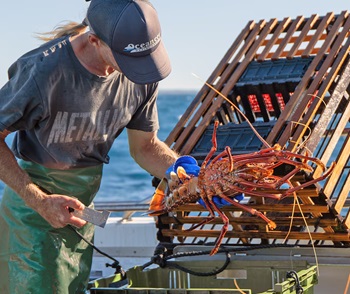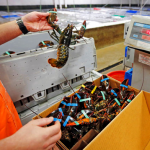Tag Archives: China
Lobster industry breathes sigh of relief as tariff threat walked back for now
 The ongoing threat of U.S. tariffs on Canadian goods and exports has been unpredictable. While lobster fishers are used to navigating rough waters, some say this level of uncertainty is becoming hard to navigate. “We’re definitely watching the bottom-line more,” said Tommy Amirault, a lobster and halibut fisherman from Lower East Pubnico, N.S. “We’re watching what we’re spending on bait, what we’re spending on traps and some of those are baked in.” Fishers like Amirault have been keeping a close eye on Canada-U.S. trade relations. The threat of a 25 per cent U.S. tariffs on seafood exports would be devastating, he said. “I don’t know any part of the industry that can handle a 25 per cent loss,” said Amirault. When U.S. President Donald Trump held back on imposing tariffs on the seafood industry yesterday it came as a huge relief. Video, more, >>Click TO READ<< 19:05
The ongoing threat of U.S. tariffs on Canadian goods and exports has been unpredictable. While lobster fishers are used to navigating rough waters, some say this level of uncertainty is becoming hard to navigate. “We’re definitely watching the bottom-line more,” said Tommy Amirault, a lobster and halibut fisherman from Lower East Pubnico, N.S. “We’re watching what we’re spending on bait, what we’re spending on traps and some of those are baked in.” Fishers like Amirault have been keeping a close eye on Canada-U.S. trade relations. The threat of a 25 per cent U.S. tariffs on seafood exports would be devastating, he said. “I don’t know any part of the industry that can handle a 25 per cent loss,” said Amirault. When U.S. President Donald Trump held back on imposing tariffs on the seafood industry yesterday it came as a huge relief. Video, more, >>Click TO READ<< 19:05
Already hit by China, Nova Scotia’s seafood sector braces for U.S. tariffs next week
 Stewart Lamont, managing director of Tangier Lobster Company Ltd., on Nova Scotia’s eastern shore, said the lobster sector is “incredibly anxious” as it waits to see how prices are affected. Lamont’s company exports live lobster to 13 countries around the world. “People are nervous,” he said in an interview Friday. “We have received more calls than normal from dealers on whether we would be interested in buying lobster from them this spring.” Meanwhile, Osborne Burke, general manager of Cape Breton-based seafood processor Victoria Co-operative Fisheries Ltd., said the pending U.S. tariffs are particularly concerning to the crab fishery because of the heavy reliance on the market south of the border. more, >>CLICK TO READ<< 08:02
Stewart Lamont, managing director of Tangier Lobster Company Ltd., on Nova Scotia’s eastern shore, said the lobster sector is “incredibly anxious” as it waits to see how prices are affected. Lamont’s company exports live lobster to 13 countries around the world. “People are nervous,” he said in an interview Friday. “We have received more calls than normal from dealers on whether we would be interested in buying lobster from them this spring.” Meanwhile, Osborne Burke, general manager of Cape Breton-based seafood processor Victoria Co-operative Fisheries Ltd., said the pending U.S. tariffs are particularly concerning to the crab fishery because of the heavy reliance on the market south of the border. more, >>CLICK TO READ<< 08:02
P.E.I. snow crab fishers to start 2025 season grappling with reduced quota, trade concerns
 Snow crab fishers on Prince Edward Island are preparing to start their fishing season next week facing a 33 per cent reduction in the amount they’re allowed to catch. The reduction is based on recommendations from scientists with the federal Department of Oceans and Fisheries, who have expressed concerns about the health of snow crab stocks. The stocks tend to rise and fall on a 10-year cycle, and the crab population is now at a below-average mark. “We’re kind of on a downhill swing here,” said Carter Hutt, president of the P.E.I. Snow Crab Association. The quota reduction for the 2025 fishing season comes as P.E.I.’s seafood industries are wondering about the impacts of U.S., and Chinese tariffs on one of the province’s major exports. Photos, more, >>CLICK TO READ<< 08:01
Snow crab fishers on Prince Edward Island are preparing to start their fishing season next week facing a 33 per cent reduction in the amount they’re allowed to catch. The reduction is based on recommendations from scientists with the federal Department of Oceans and Fisheries, who have expressed concerns about the health of snow crab stocks. The stocks tend to rise and fall on a 10-year cycle, and the crab population is now at a below-average mark. “We’re kind of on a downhill swing here,” said Carter Hutt, president of the P.E.I. Snow Crab Association. The quota reduction for the 2025 fishing season comes as P.E.I.’s seafood industries are wondering about the impacts of U.S., and Chinese tariffs on one of the province’s major exports. Photos, more, >>CLICK TO READ<< 08:01
Atlantic lobster industry could be hurt by tariffs from China, U.S.
 Atlantic Canada’s $2.9-billion lobster industry could be impacted by tariffs imposed by the United States and China, an industry spokesperson said Tuesday. “At the moment we really don’t know how much impact there will be,” said Geoff Irvine, executive director of the Halifax-based Canadian Lobster Council. China imposed a 25 per cent tariff on Canadian seafood March 20, and U.S. President Donald Trump has threatened to begin tariffs on Canadian products on April 2. Tariffs on Atlantic Canada’s lucrative lobster fishery were among the topics of discussion at the Maritime Fishermen’s Union annual convention, held in Moncton Monday and Tuesday. Irvine said Atlantic Canada exports approximately $2.9 billion worth of lobster annually, with 67 per cent going to the United States and 20 per cent going to China. more, >>CLICK TO READ<< 08:34
Atlantic Canada’s $2.9-billion lobster industry could be impacted by tariffs imposed by the United States and China, an industry spokesperson said Tuesday. “At the moment we really don’t know how much impact there will be,” said Geoff Irvine, executive director of the Halifax-based Canadian Lobster Council. China imposed a 25 per cent tariff on Canadian seafood March 20, and U.S. President Donald Trump has threatened to begin tariffs on Canadian products on April 2. Tariffs on Atlantic Canada’s lucrative lobster fishery were among the topics of discussion at the Maritime Fishermen’s Union annual convention, held in Moncton Monday and Tuesday. Irvine said Atlantic Canada exports approximately $2.9 billion worth of lobster annually, with 67 per cent going to the United States and 20 per cent going to China. more, >>CLICK TO READ<< 08:34
Maritime seafood industry officials looking for new buyers at Boston expo
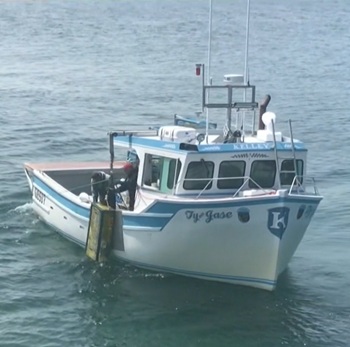 The Seafood Expo North America is the largest event of its kind on the continent. With importers, exporters, wholesalers and hotel operators from 50 countries in attendance, it’s the perfect place to pitch Nova Scotia seafood to the world. “I was expecting doom and gloom when I came down here and it is not that. There’s a lot more optimism for the demand for our product and will be able to get through this storm,” says Fisheries Minister Kent Smith. Smith says Nova Scotia companies have a deal with a new contact in the Philippines and one is in the works with an existing importer in Spain to expand that market. Lobster seller Shawn Landry has been busy, too. “Singapore was one of the ones that we talked with. Southeast Asia, Italy, and Europe,” he says. more, >>CLICK TO READ<< 07:47
The Seafood Expo North America is the largest event of its kind on the continent. With importers, exporters, wholesalers and hotel operators from 50 countries in attendance, it’s the perfect place to pitch Nova Scotia seafood to the world. “I was expecting doom and gloom when I came down here and it is not that. There’s a lot more optimism for the demand for our product and will be able to get through this storm,” says Fisheries Minister Kent Smith. Smith says Nova Scotia companies have a deal with a new contact in the Philippines and one is in the works with an existing importer in Spain to expand that market. Lobster seller Shawn Landry has been busy, too. “Singapore was one of the ones that we talked with. Southeast Asia, Italy, and Europe,” he says. more, >>CLICK TO READ<< 07:47
Snow crab now crab as FFAW and ASP show willingness to work together
 A week of long days and almost around the clock negotiations has left the Fish, Food and Allied Workers union and the Association of Seafood Producers optimistic that a snow crab harvest will happen this year. “The FFAW and ASP have done an incredible job together to have constructive conversations at this point,” ASP executive director Jeff Loder said Wednesday. “Of course, until you get a deal, you have no deal. But I am cautiously optimistic that we are close.” The two sides are keen to negotiate a deal as soon as possible. A meeting with a price setting panel is scheduled for March 20 should the two sides not make an agreement by then. Video, more, >>CLICK TO READ<< 06:08
A week of long days and almost around the clock negotiations has left the Fish, Food and Allied Workers union and the Association of Seafood Producers optimistic that a snow crab harvest will happen this year. “The FFAW and ASP have done an incredible job together to have constructive conversations at this point,” ASP executive director Jeff Loder said Wednesday. “Of course, until you get a deal, you have no deal. But I am cautiously optimistic that we are close.” The two sides are keen to negotiate a deal as soon as possible. A meeting with a price setting panel is scheduled for March 20 should the two sides not make an agreement by then. Video, more, >>CLICK TO READ<< 06:08
N.S. premier promoting seafood, minerals on New York, Boston trade junket
 Nova Scotia’s premier is promoting the province’s seafood and critical mineral deposits on a tour that will take him to Boston and New York this week and next. “Now, more than ever, we have to diversify our economy,” Houston said in a government release. “We have to go where the buyers are. Nova Scotia has a lot to offer, from high-quality products like seafood and resources like critical minerals.” The province exported more than a billion dollars’ worth of lobster in 2024, making lobster its second largest export. The two countries that collectively import about 80 per cent of live Nova Scotia lobsters are China and the United States, both of which have said lobster will face tariffs in the coming weeks. more, >>CLICK TO READ<< 15:28
Nova Scotia’s premier is promoting the province’s seafood and critical mineral deposits on a tour that will take him to Boston and New York this week and next. “Now, more than ever, we have to diversify our economy,” Houston said in a government release. “We have to go where the buyers are. Nova Scotia has a lot to offer, from high-quality products like seafood and resources like critical minerals.” The province exported more than a billion dollars’ worth of lobster in 2024, making lobster its second largest export. The two countries that collectively import about 80 per cent of live Nova Scotia lobsters are China and the United States, both of which have said lobster will face tariffs in the coming weeks. more, >>CLICK TO READ<< 15:28
China slaps 25 per cent tariff on N.S. lobster, throwing seafood industry into turmoil
 Chinese counter tariffs on Canadian seafood will include east coast lobster. Nova Scotian exporters have heard directly from buyers in China that the 25 per cent tariff goes into effect March 20. “For America and China to simultaneously, and for entirely different reasons, target Canadian seafood is incredibly poor luck, and beyond that it is incredibly hard to comprehend,” Stewart Lamont, owner of Tangier Lobster, said on Sunday. Just over 40 per cent of Nova Scotia’s live lobster exports go to China. About 40 per cent of live lobster exports, along with 70 per cent of frozen processed lobster, go to the United States. more, >>CLICK TO READ<< 12:10
Chinese counter tariffs on Canadian seafood will include east coast lobster. Nova Scotian exporters have heard directly from buyers in China that the 25 per cent tariff goes into effect March 20. “For America and China to simultaneously, and for entirely different reasons, target Canadian seafood is incredibly poor luck, and beyond that it is incredibly hard to comprehend,” Stewart Lamont, owner of Tangier Lobster, said on Sunday. Just over 40 per cent of Nova Scotia’s live lobster exports go to China. About 40 per cent of live lobster exports, along with 70 per cent of frozen processed lobster, go to the United States. more, >>CLICK TO READ<< 12:10
Will the tariff tiff tear at the fabric of Canada-U.S. seafood trade?
 From snow crab and lobster to Pacific salmon, seafood is a trade driver between Canada and the United States. This cross-border commerce has mutually benefited the two nations, but rising trade tensions now threaten this critical supply chain. This month, President Donald Trump has signed executive orders imposing broad tariffs on Canada, Mexico and China, its top trading partners. With a trade war still looming, the seafood sector faces uncertainty over pricing, market access and job security. Across Canada, industry leaders are bracing for economic fallout as possible tariffs could disrupt the flow of seafood between the two nations. The seafood trade between Canada and the United States generates billions in revenue annually, benefiting both countries. Canada imported (U.S.) $3.1 billion worth of seafood in 2023 alone, with the United States supplying the largest share at $1 billion – making up 31 percent of Canada’s total seafood imports. On the flip side, the United States imported more than $3.6 billion in seafood products from Canada, making it the country’s largest supplier. more, >>CLICK TO READ<<< 10:39
From snow crab and lobster to Pacific salmon, seafood is a trade driver between Canada and the United States. This cross-border commerce has mutually benefited the two nations, but rising trade tensions now threaten this critical supply chain. This month, President Donald Trump has signed executive orders imposing broad tariffs on Canada, Mexico and China, its top trading partners. With a trade war still looming, the seafood sector faces uncertainty over pricing, market access and job security. Across Canada, industry leaders are bracing for economic fallout as possible tariffs could disrupt the flow of seafood between the two nations. The seafood trade between Canada and the United States generates billions in revenue annually, benefiting both countries. Canada imported (U.S.) $3.1 billion worth of seafood in 2023 alone, with the United States supplying the largest share at $1 billion – making up 31 percent of Canada’s total seafood imports. On the flip side, the United States imported more than $3.6 billion in seafood products from Canada, making it the country’s largest supplier. more, >>CLICK TO READ<<< 10:39
Louisiana: Rep. Higgins asks President Trump for seafood tariff
 Rep. Clay Higgins (R-LA) has delivered an official letter to President Trump, requesting tariffs and increased trade enforcement on seafood imports. Countries specifically mentioned in the letter include China, Ecuador, India, Indonesia, and Vietnam, which Higgins says are hampering domestic shrimpers, fishermen, and crawfish producers. He says foreign seafood industries are heavily subsidized and engage in illegal dumping into the United States, artificially driving down prices and disrupting fair market conditions. You can read the letter in full below. more, >>CLICK TO READ<<14:53
Rep. Clay Higgins (R-LA) has delivered an official letter to President Trump, requesting tariffs and increased trade enforcement on seafood imports. Countries specifically mentioned in the letter include China, Ecuador, India, Indonesia, and Vietnam, which Higgins says are hampering domestic shrimpers, fishermen, and crawfish producers. He says foreign seafood industries are heavily subsidized and engage in illegal dumping into the United States, artificially driving down prices and disrupting fair market conditions. You can read the letter in full below. more, >>CLICK TO READ<<14:53

U.S. tariffs on Canadian goods will come into effect Saturday, White House says
U.S. President Donald Trump on Friday offered vague details on his plans to impose tariffs on goods coming from Canada, Mexico and China, after a spokesperson said they would take effect Saturday. White House press secretary Karoline Leavitt said the president would put a 25 per cent tariff on Canada and Mexico and a 10 per cent tariff on goods from China during a briefing on Friday. Speaking to reporters in the Oval Office hours later, Trump said he expects the tariffs would include oil, gas, steel, aluminum, copper and microchips — but potentially with staggered dates and rates, depending on the product. Foreign Affairs Minister Mélanie Joly said she heard the president’s public comments but had not received any further information. more, >>CLICK TO READ<< 09:36
China-Australia Relations: Beijing resumes imports of Australian lobster after 4-year ban
 Australian lobsters are heading to China once again, after a 4-year absence. The industry says the removal of a trade ban by China late last year has opened the door to its biggest and most profitable export destination, just in time for the Chinese New Year. The haul on this day was a good one for Basil Lenzo and his crew. About 400 kilos of western rock lobsters. What’s even more significant for the 3rd generation fisher is that much of this catch will end up in China. In 2019, about 95% of Australia’s western rock lobsters were sent to China, which was the industry’s most profitable export market worth more than $700 million. The next year, China imposed tariffs and trade blockages on a number of Australian exports including lobsters. Video, more, >>CLICK TO READ<< 19:30
Australian lobsters are heading to China once again, after a 4-year absence. The industry says the removal of a trade ban by China late last year has opened the door to its biggest and most profitable export destination, just in time for the Chinese New Year. The haul on this day was a good one for Basil Lenzo and his crew. About 400 kilos of western rock lobsters. What’s even more significant for the 3rd generation fisher is that much of this catch will end up in China. In 2019, about 95% of Australia’s western rock lobsters were sent to China, which was the industry’s most profitable export market worth more than $700 million. The next year, China imposed tariffs and trade blockages on a number of Australian exports including lobsters. Video, more, >>CLICK TO READ<< 19:30
Indigenous fishers, co-operatives are winners in Ottawa’s shuffle of baby eel quotas
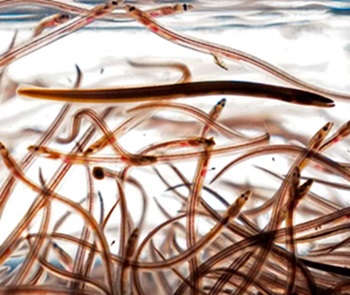 Ottawa has issued the latest version of how it is proposing to distribute licences for the lucrative baby eel fishery in the Maritimes. In a letter to stakeholders on Monday, the Fisheries Department says it is maintaining its plan to shift half the quota of close to 10,000 kilograms of elvers away from nine large licence holders to new entrants from Indigenous communities. However, Ottawa confirms it is backing away from a pilot project to redistribute 27 per cent of the catch of the nine licence holders to 120 fishers who used to work for them. That old pilot proposal, introduced in December, drew strong criticism from the potential recipients, who said they preferred to remain employees and felt safer on the rivers under the existing arrangement. more, >>CLICK TO READ<< 15:33
Ottawa has issued the latest version of how it is proposing to distribute licences for the lucrative baby eel fishery in the Maritimes. In a letter to stakeholders on Monday, the Fisheries Department says it is maintaining its plan to shift half the quota of close to 10,000 kilograms of elvers away from nine large licence holders to new entrants from Indigenous communities. However, Ottawa confirms it is backing away from a pilot project to redistribute 27 per cent of the catch of the nine licence holders to 120 fishers who used to work for them. That old pilot proposal, introduced in December, drew strong criticism from the potential recipients, who said they preferred to remain employees and felt safer on the rivers under the existing arrangement. more, >>CLICK TO READ<< 15:33
Ottawa scraps elver fishery quota redistribution plan after backlash
 The federal government is no longer moving forward with its plan to redistribute the wealth of Nova Scotia’s baby eel harvest from large licence holders to individual fishers after receiving backlash from the industry. A statement from Fisheries Minister Diane Lebouthillier’s office said the minister reached the decision after listening to feedback from stakeholders in consultations held by the Department of Fisheries and Oceans (DFO) in recent weeks. A subsequent letter from the DFO in December to fishers detailing the planned redistribution said the nine commercial licensees that dominate the fishery would lose between 60 per cent and 90 per cent of their quotas, without compensation from the federal government. Video, more, >>CLICK TO READ<< 16:45
The federal government is no longer moving forward with its plan to redistribute the wealth of Nova Scotia’s baby eel harvest from large licence holders to individual fishers after receiving backlash from the industry. A statement from Fisheries Minister Diane Lebouthillier’s office said the minister reached the decision after listening to feedback from stakeholders in consultations held by the Department of Fisheries and Oceans (DFO) in recent weeks. A subsequent letter from the DFO in December to fishers detailing the planned redistribution said the nine commercial licensees that dominate the fishery would lose between 60 per cent and 90 per cent of their quotas, without compensation from the federal government. Video, more, >>CLICK TO READ<< 16:45
A rundown of Trump’s executive actions
 President Donald Trump wasted no time announcing steps to implement many of his campaign pledges, including on immigration, energy, the military and federal workforce, casting many as reversing the policies of his predecessor, Joe Biden. “We will immediately restore the integrity, competency and loyalty of America’s government,” Trump said in his inaugural address on Monday (Tuesday AEDT). “With these actions, we will begin the complete restoration of America, and the revolution of common sense.” While Trump is still signing more orders on Monday night in Washington, here’s a brief rundown of what we know so far that his administration plans to initiate, taken from his speech, public information about the orders, briefings by incoming officials and public statements. more, >>CLICK TO READ<< 06:23
President Donald Trump wasted no time announcing steps to implement many of his campaign pledges, including on immigration, energy, the military and federal workforce, casting many as reversing the policies of his predecessor, Joe Biden. “We will immediately restore the integrity, competency and loyalty of America’s government,” Trump said in his inaugural address on Monday (Tuesday AEDT). “With these actions, we will begin the complete restoration of America, and the revolution of common sense.” While Trump is still signing more orders on Monday night in Washington, here’s a brief rundown of what we know so far that his administration plans to initiate, taken from his speech, public information about the orders, briefings by incoming officials and public statements. more, >>CLICK TO READ<< 06:23
‘The only winner here is China.’ How DFO invested in and then killed Canadian eel aquaculture
 An aquaculture project that would have seen elvers grown to adulthood in Atlantic Canada rather than China has been thrown into disarray by DFO’s quota reallocation. Despite millions in investment, over a decade of research and the potential to increase profits for all involved ten-fold, federal Fisheries Minister Diane Lebouthillier won’t even respond to NovaEel’s letters. “The undermining of NovaEel means for the foreseeable future, or forever, there will be no domestic capacity to exploit our natural resource, and we will be 100 per cent beholden to foreign entities to realize value,” said Mitchell Feigenbaum, a commercial elver licence holder and investor in NovaEel. “Those entities are not going to invest in eel farms in North America and they have demonstrated the willingness and ability to support the trade of unlawfully caught eels without any hesitation.” more, >>CLICK TO READ<< 11:07
An aquaculture project that would have seen elvers grown to adulthood in Atlantic Canada rather than China has been thrown into disarray by DFO’s quota reallocation. Despite millions in investment, over a decade of research and the potential to increase profits for all involved ten-fold, federal Fisheries Minister Diane Lebouthillier won’t even respond to NovaEel’s letters. “The undermining of NovaEel means for the foreseeable future, or forever, there will be no domestic capacity to exploit our natural resource, and we will be 100 per cent beholden to foreign entities to realize value,” said Mitchell Feigenbaum, a commercial elver licence holder and investor in NovaEel. “Those entities are not going to invest in eel farms in North America and they have demonstrated the willingness and ability to support the trade of unlawfully caught eels without any hesitation.” more, >>CLICK TO READ<< 11:07
Offshore Wind is no breeze
 This may just be a tad too radical for some, but I believe there’s a chance the great offshore wind boom is in serious danger of coming to a screaming halt and for the consumer, this may not be a bad thing. In fact, the more I think about it the more I believe that it may be a very good thing. Why? Well, let’s do the easy bit first. For Scotland, the industrial benefit of offshore wind is extremely limited and if the offshore wind industry disappeared overnight, it wouldn’t be as huge a loss to us as it would to countries such as Denmark, Germany and of course, China. You can argue about that amongst yourselves but anyway what’s much more likely to put the brakes on offshore wind is that the cost of offshore wind projects has increased dramatically and it’s increasingly difficult to see how to make money out of it without huge government guarantees and yet the minimum strike price being offered by governments under contracts for difference deals hasn’t been high enough to deal with that. It’s the reason the Danish Energy Agency didn’t receive a single bid for any of the three offshore wind farms last month. more, >>CLICK TO READ<< 08:25 By Dick Winchester
This may just be a tad too radical for some, but I believe there’s a chance the great offshore wind boom is in serious danger of coming to a screaming halt and for the consumer, this may not be a bad thing. In fact, the more I think about it the more I believe that it may be a very good thing. Why? Well, let’s do the easy bit first. For Scotland, the industrial benefit of offshore wind is extremely limited and if the offshore wind industry disappeared overnight, it wouldn’t be as huge a loss to us as it would to countries such as Denmark, Germany and of course, China. You can argue about that amongst yourselves but anyway what’s much more likely to put the brakes on offshore wind is that the cost of offshore wind projects has increased dramatically and it’s increasingly difficult to see how to make money out of it without huge government guarantees and yet the minimum strike price being offered by governments under contracts for difference deals hasn’t been high enough to deal with that. It’s the reason the Danish Energy Agency didn’t receive a single bid for any of the three offshore wind farms last month. more, >>CLICK TO READ<< 08:25 By Dick Winchester
End to lobster war with China could save Australia’s fishermen
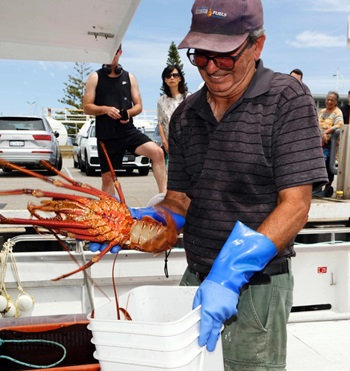 In this part of the world, the small, spiny, clawless western rock lobsters — commonly known in Australia as crayfish — play a starring role on seafood platters. “It’s our busiest time of the year,” said James Paratore, a fisherman who will be among those selling the lobsters from the back of his boat on Monday with his father Joe in Fremantle, near Perth. While trade in the local delicacy picks up over the festive period, the fishing industry has struggled since losing its biggest customer by far: China. Four years ago, exports to the lucrative Chinese market were sealed off by a trade war. Now they are in a cautiously celebratory mood after Beijing confirmed on Friday its trade ban on Australian rock lobsters had officially been lifted. Photos, more, >>CLICK TO READ<< 06:54
In this part of the world, the small, spiny, clawless western rock lobsters — commonly known in Australia as crayfish — play a starring role on seafood platters. “It’s our busiest time of the year,” said James Paratore, a fisherman who will be among those selling the lobsters from the back of his boat on Monday with his father Joe in Fremantle, near Perth. While trade in the local delicacy picks up over the festive period, the fishing industry has struggled since losing its biggest customer by far: China. Four years ago, exports to the lucrative Chinese market were sealed off by a trade war. Now they are in a cautiously celebratory mood after Beijing confirmed on Friday its trade ban on Australian rock lobsters had officially been lifted. Photos, more, >>CLICK TO READ<< 06:54
Some in seafood industry see Trump as fishermen’s friend, but tariffs could make for pricier fish
 The incoming administration of President-elect Donald Trump is likely to bring big changes for one of the oldest sectors of the U.S. economy, seafood, and some in the industry believe the returning president will be more responsive to its needs. Economic analysts paint a more complicated picture, as they fear Trump’s pending trade hostilities with major trading partners Canada and China could make an already pricy kind of protein more expensive to consumers. Conservationists also fear Trump’s emphasis on government deregulation could jeopardize fish stocks that are already in peril. But many in the commercial fishing and seafood processing industries said they are excited for Trump’s second presidency. They said they expect he’ll allow fishing in protected areas as he did in his first presidency, crack down on offshore wind expansion and cut back regulations they describe as burdensome. And they expect a marked shift from the administration of President Joe Biden, who prioritized ocean conservation and championed wind power from the start. Video, more, >>CLICK TO READ<< 10:26
The incoming administration of President-elect Donald Trump is likely to bring big changes for one of the oldest sectors of the U.S. economy, seafood, and some in the industry believe the returning president will be more responsive to its needs. Economic analysts paint a more complicated picture, as they fear Trump’s pending trade hostilities with major trading partners Canada and China could make an already pricy kind of protein more expensive to consumers. Conservationists also fear Trump’s emphasis on government deregulation could jeopardize fish stocks that are already in peril. But many in the commercial fishing and seafood processing industries said they are excited for Trump’s second presidency. They said they expect he’ll allow fishing in protected areas as he did in his first presidency, crack down on offshore wind expansion and cut back regulations they describe as burdensome. And they expect a marked shift from the administration of President Joe Biden, who prioritized ocean conservation and championed wind power from the start. Video, more, >>CLICK TO READ<< 10:26
Commercial lobster fishers want total catch cut to help save WA fishery
 Commercial fishers in Western Australia’s $285 million lobster industry say warning bells are ringing for the sector’s future sustainability, despite reassurances from state government scientists that stocks are at healthy levels. The commercial lobster industry is concerned due to the number of baby lobster, known as puerulus, being found along the coast, along with falling catch rates and revised economic modelling. As a result, the industry has requested its total catch be dropped next season from the current limit of 7,300 tonnes to 6,800 tonnes. Cervantes based fisher Michael Thompson supported the catch reduction and said it could have gone lower. “Our puerulus since 2007 till today is 50 per cent lower than what we used to receive back to the coast to our collectors,” he said. Photos, more, >>CLICK TO READ<< 10:02
Commercial fishers in Western Australia’s $285 million lobster industry say warning bells are ringing for the sector’s future sustainability, despite reassurances from state government scientists that stocks are at healthy levels. The commercial lobster industry is concerned due to the number of baby lobster, known as puerulus, being found along the coast, along with falling catch rates and revised economic modelling. As a result, the industry has requested its total catch be dropped next season from the current limit of 7,300 tonnes to 6,800 tonnes. Cervantes based fisher Michael Thompson supported the catch reduction and said it could have gone lower. “Our puerulus since 2007 till today is 50 per cent lower than what we used to receive back to the coast to our collectors,” he said. Photos, more, >>CLICK TO READ<< 10:02
Australian rock lobster will soon be exported to China again — here’s what it means for the industry and consumers
China’s ban on Australian rock lobsters is expected to be lifted by the end of the year, Prime Minister Anthony Albanese has announced. Rock lobster fishers say China is “by far” their biggest market and the impact on coastal WA communities will be significant. However, it could mean Australians will end up paying more for the prized delicacy once exports resume. Australian rock lobster fishers soon will be able to export their prized catches to China again, after four years out in the cold. The welcome development was announced yesterday following a meeting between Prime Minister Anthony Albanese and Chinese Premier Li Qiang on the sidelines of the ASEAN summit in Vietnam. Exports are expected to resume by the end of the year, in time for Chinese New Year in 2025. Here’s what it means for Australia. Photos, more, >>CLICK TO READ<< 19:15
UK fishermen ‘at the very bottom of the heap’
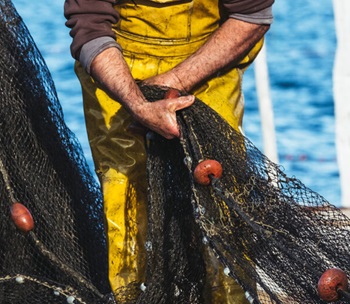 A paper published in the scientific journal Marine Policy, with a wide group of authors, some attached to anti-fishing NGOs, shows starkly how bad a deal UK fishermen have in Europe. The UK EEZ is a key fishing ground for fleets from the EU and Norway, which are provided with huge amounts of government support to fish in British and, to a lesser extent, Irish waters. Ireland is the only country remaining within the EU that is a net ‘subsidy sink’, with vessels fishing what would be the Irish EEZ – were Ireland independent – receiving more financial support to fish there than the Irish fleet itself receives. But the figures for Ireland are dwarfed by those for the UK, which, the study says, is an ‘outlier’ worldwide. There is otherwise a pattern of richer nations – in particular China, Spain, Korea, Japan and the USA – being given support to extract fish from much poorer developing countries. The paper doesn’t attempt to explain quite why the UK is such an outlier. more, >>CLICK TO READ<< 10:29
A paper published in the scientific journal Marine Policy, with a wide group of authors, some attached to anti-fishing NGOs, shows starkly how bad a deal UK fishermen have in Europe. The UK EEZ is a key fishing ground for fleets from the EU and Norway, which are provided with huge amounts of government support to fish in British and, to a lesser extent, Irish waters. Ireland is the only country remaining within the EU that is a net ‘subsidy sink’, with vessels fishing what would be the Irish EEZ – were Ireland independent – receiving more financial support to fish there than the Irish fleet itself receives. But the figures for Ireland are dwarfed by those for the UK, which, the study says, is an ‘outlier’ worldwide. There is otherwise a pattern of richer nations – in particular China, Spain, Korea, Japan and the USA – being given support to extract fish from much poorer developing countries. The paper doesn’t attempt to explain quite why the UK is such an outlier. more, >>CLICK TO READ<< 10:29
Something Is Starting to Smell Fishy About the Global Seafood Supply Chain
 The past half year has seen a steady stream of disturbing reports about serious human rights abuses tied to industrial fishing. The story about conditions at the shrimp plant in India come against a broader backdrop. The same week that the whistleblower documents were published, the Corporate Accountability Lab, which is an advocacy group of lawyers and researchers, released a report detailing severe cases of captive and forced labor as well as environmental concerns often tied to wastewater at a variety of other shrimp plants in India. It’s worth remembering the history here. Labor abuse tied to seafood is not a new problem. And yet, here we are again: the seafood problems previously highlighted in Thailand are now being widely revealed in China and India. more, >>click to read<< 08:05
The past half year has seen a steady stream of disturbing reports about serious human rights abuses tied to industrial fishing. The story about conditions at the shrimp plant in India come against a broader backdrop. The same week that the whistleblower documents were published, the Corporate Accountability Lab, which is an advocacy group of lawyers and researchers, released a report detailing severe cases of captive and forced labor as well as environmental concerns often tied to wastewater at a variety of other shrimp plants in India. It’s worth remembering the history here. Labor abuse tied to seafood is not a new problem. And yet, here we are again: the seafood problems previously highlighted in Thailand are now being widely revealed in China and India. more, >>click to read<< 08:05
“Squid Fleet” Takes You Into the Opaque World of Chinese Fishing
 In February, 2022, I invited the documentary filmmaker Ed Ou to join me at sea, boarding Chinese squid ships. For the past four years, I have been visiting these ships as part of an investigation into the use of forced labor by the global seafood industry. China has the world’s largest distant water fishing fleet, catching billions of pounds of seafood annually, the biggest portion of it squid. The fleet is rife with labor trafficking, abusive working conditions, and violence. But China publicly releases little information about its vessels, and most stay at sea for more than a year, making them difficult to track or inspect. To see the fleet up close, Ou and I travelled to fishing grounds near the Falkland Islands and the Galápagos. We chased boats, interviewed crews by radio, and, when permitted, boarded ships. My goal was to talk to crew members and chronicle their working conditions. “Squid Fleet,” the film that Ou produced, offers something deeper. Ou and his co-director, Will N. Miller, made a hybrid documentary, combining fictionalized narration with real footage from the trip to capture a strange world that few outsiders get to see. 13:45 Video trailer, >>click to read<< 21:36
In February, 2022, I invited the documentary filmmaker Ed Ou to join me at sea, boarding Chinese squid ships. For the past four years, I have been visiting these ships as part of an investigation into the use of forced labor by the global seafood industry. China has the world’s largest distant water fishing fleet, catching billions of pounds of seafood annually, the biggest portion of it squid. The fleet is rife with labor trafficking, abusive working conditions, and violence. But China publicly releases little information about its vessels, and most stay at sea for more than a year, making them difficult to track or inspect. To see the fleet up close, Ou and I travelled to fishing grounds near the Falkland Islands and the Galápagos. We chased boats, interviewed crews by radio, and, when permitted, boarded ships. My goal was to talk to crew members and chronicle their working conditions. “Squid Fleet,” the film that Ou produced, offers something deeper. Ou and his co-director, Will N. Miller, made a hybrid documentary, combining fictionalized narration with real footage from the trip to capture a strange world that few outsiders get to see. 13:45 Video trailer, >>click to read<< 21:36
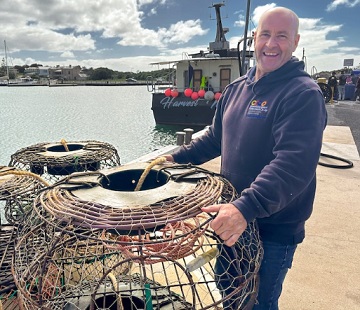
Lobster season underway, but South Australian fishers still missing out on Chinese trade
Lobster fishers in South Australia’s southern zone are heading out today to set their pots for the start of the season. After a two-year trial, the season’s September 1 start date has become permanent in the hope it will help get lobsters onto the plates of those celebrating the Chinese Mid-Autumn Festival. Robe lobster fisher Paul Regnier supports the change. “It has been a real bonus for us,” he said. But China is still not allowing Mr Regnier’s catch into the country — officially, at least. China’s 2020 ban on Australian lobsters sent prices crashing and exporters were forced to find new markets for the crustaceans. >>click to read<< 10:34
Fukushima residents cautious after wrecked nuclear plant begins releasing treated wastewater
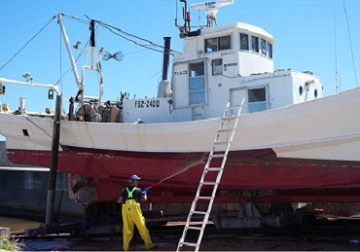 Fish auction prices at a port south of the Fukushima Daiichi nuclear power plant were mixed amid uncertainty over how seafood consumers will respond to the release of treated and diluted radioactive wastewater into the ocean. The plant, which was damaged in the 2011 earthquake and tsunami, began sending the treated water into the Pacific on Thursday despite protests at home and in nearby countries that are adding political and diplomatic pressures to the economic worries. The decades long release has been strongly opposed by fishing groups and criticized by neighboring countries. Japanese fishing groups fear the release will do more harm to the reputation of seafood from the Fukushima area. Photos, >click to read< 16:25
Fish auction prices at a port south of the Fukushima Daiichi nuclear power plant were mixed amid uncertainty over how seafood consumers will respond to the release of treated and diluted radioactive wastewater into the ocean. The plant, which was damaged in the 2011 earthquake and tsunami, began sending the treated water into the Pacific on Thursday despite protests at home and in nearby countries that are adding political and diplomatic pressures to the economic worries. The decades long release has been strongly opposed by fishing groups and criticized by neighboring countries. Japanese fishing groups fear the release will do more harm to the reputation of seafood from the Fukushima area. Photos, >click to read< 16:25
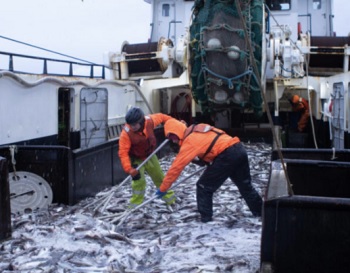
Tons of fish caught in Russia is sold in America, despite import ban
President Joe Biden signed an import ban on Russian seafood last year, but fish valued at several hundred millions of dollars are able to evade the ban by diverting to another another country before arriving on American shores. “There has been a huge loophole where the Russians have been now sending their fish – it’s pollock, it’s salmon, a little bit less crab – to other countries for reprocessing, primarily China,” U.S. Sen. Dan Sullivan told reporters Thursday. The ban was intended to ensure Americans aren’t indirectly financing Russia’s war on Ukraine through their purchases. >click to read< 11:07






 Millions of TikTok users in the United States are no longer able to watch videos on the social media platform as a federal ban on the immensely popular app takes effect. The company’s app was removed Saturday evening from prominent app stores, including the ones operated by Apple and Google, while its website told users that the short-form video platform was no longer available. The blackout began just hours before the law took effect. Users opening the TikTok app on Saturday encountered a pop-up message preventing them from scrolling videos that read, “Sorry, TikTok isn’t available right now.” “We are fortunate that President Trump has indicated that he will work with us on a solution to reinstate TikTok once he takes office,” the notice continued, in a reference to President-elect Donald Trump’s pledge to “save” the platform. The company told its users to stay tuned.
Millions of TikTok users in the United States are no longer able to watch videos on the social media platform as a federal ban on the immensely popular app takes effect. The company’s app was removed Saturday evening from prominent app stores, including the ones operated by Apple and Google, while its website told users that the short-form video platform was no longer available. The blackout began just hours before the law took effect. Users opening the TikTok app on Saturday encountered a pop-up message preventing them from scrolling videos that read, “Sorry, TikTok isn’t available right now.” “We are fortunate that President Trump has indicated that he will work with us on a solution to reinstate TikTok once he takes office,” the notice continued, in a reference to President-elect Donald Trump’s pledge to “save” the platform. The company told its users to stay tuned. 